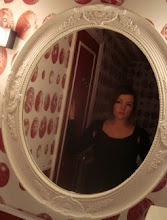 Yes, Japanese tv is educational for me in general right now, I can train my listening skills and so on, blabla. But that`s not what it`s about this time. Today I watched an English language educational program or rather game show. It was quite amusing just as most of the English teaching methods in use in this country.
Yes, Japanese tv is educational for me in general right now, I can train my listening skills and so on, blabla. But that`s not what it`s about this time. Today I watched an English language educational program or rather game show. It was quite amusing just as most of the English teaching methods in use in this country.The program is a designed as a game show where 6 candidates have to answer various English language questions and the spectators can also participate by clicking numbers 1-4 for the different options on their mobile phone. Obviously there are a few people (around 20`000 for each ques
 tion) who feel inclined to provide their vote to the "English language poll".
tion) who feel inclined to provide their vote to the "English language poll".The first part consisted of gap filling type of questions. They showed an English phrase like "I ... cat out of the bag while I was drunk" (?!) and then 4 suggestions how the gap could be filled: 1) got 2) had 3) let 4) made. Hm, could be 2), "I had cat out of the bag while I was drunk", meaning I was so pissed that I ate cat out of a bag... Or 4), was drunk and started doing Origami with the bag resulting in a cat type of shape...
 Turned out that the correct answer was 3) and the candidates who got it right were as proud as you can be. This is certainly a very useful phrase for the Japanese general public. Considering how many drunk people you see every night on the late trains, this must be some real life example and accordingly knowing how to describe such incidents should be useful...
Turned out that the correct answer was 3) and the candidates who got it right were as proud as you can be. This is certainly a very useful phrase for the Japanese general public. Considering how many drunk people you see every night on the late trains, this must be some real life example and accordingly knowing how to describe such incidents should be useful...I found the second part of the quiz a bit insulting because it dwelled on the (true) cliche that Japanese people can`t pronounce English at all and are equally bad at understanding properly pronounced English. It`s not suprising though since foreign terms are all spelled in Katakana, a syllable script
 that clearly does not consist of enough sounds to accurately note English words. Don`t ask for "McDonalds" here, nobody will understand you. Say "Maggu Donarudsu" and you will be received with more cooperation. Even simple sounding, short words like "hot" should be pronounced katakana-style, I had to learn this when drinking coffee with a Japanese friend. Say "hotto" please... So those exercises in the show consisted of a native speaker seemingly saying the same word three times, but in fact one of the three was a different but similar sounding word, like "curves-curbs-curbs" or
that clearly does not consist of enough sounds to accurately note English words. Don`t ask for "McDonalds" here, nobody will understand you. Say "Maggu Donarudsu" and you will be received with more cooperation. Even simple sounding, short words like "hot" should be pronounced katakana-style, I had to learn this when drinking coffee with a Japanese friend. Say "hotto" please... So those exercises in the show consisted of a native speaker seemingly saying the same word three times, but in fact one of the three was a different but similar sounding word, like "curves-curbs-curbs" or  "Shelley-Sherry-Shelley" and the candidates had to press button 1, 2 or 3 to indicate which was the deviating word.
"Shelley-Sherry-Shelley" and the candidates had to press button 1, 2 or 3 to indicate which was the deviating word.The last part was a very strange drama scene between a Japanese man in an American bar, talking to the bar tender, a fellow customer and finally a fortune teller. He hasn`t heard from his girlfriends who`s back home in Japan for the past 24 hours and is now worried. The compassionate bartender and fellow customer call the fortuneteller to indicate that she has run off with another guy. The candidates then got single scenes out of the small drama and had to choose the correct content of it from a multiple choice. The story was stupid and strange enough that even an English native speaker woul
 d have become a little confused...
d have become a little confused...Well, overall this program that is produced by Japan`s national tv NHK is an excellent opportunity for the Japanese public to learn fluent English through relevant phrases and real life conversations. It`s an equally suitable method as learning English through presidential inauguration speeches (see previous post), through katakana spelled loanwords or with some "fresh-out-of-college" American slacker, highly experienced in teaching languages as they have learned several of them themselves and of course all have teaching qualifications... Good God, English teaching in this country is severely messed up!!!

No comments:
Post a Comment